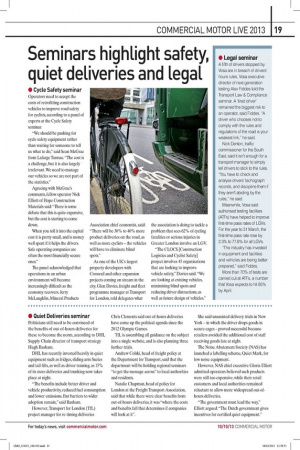• Quiet Deliveries seminar
Page 15

If you've noticed an error in this article please click here to report it so we can fix it.
Politicians still need to be convinced of the benefits of out-of-hours deliveries for these to become the norm, according to DHL Supply Chain director of transport strategy Hugh Basham.
DHL has recently invested heavily in quiet equipment such as fridges, sliding arm Suzies and tail-lifts, as well as driver training, as 15% of its store deliveries and trunking now takes place at night.
"The benefits include better driver and vehicle productivity, reduced fuel consumption and lower emissions. But barriers to wider adoption remain," said Basham. However, Transport for London (TfL) project manager for re-timing deliveries
Chris Clements said out-of-hours deliveries have come up the political agenda since the 2012 Olympic Games.
TfL is assembling all guidance on the subject into a single website, and is also planning three further trials.
Andrew Colski, head of freight policy at the Department for Transport, said that the department will be holding regional seminars "to get the message across" to local authorities and residents.
Natalie Chapman, head of policy for London at the Freight Transport Association, said that while there were clear benefits from out-of-hours deliveries, it was "where the costs and benefits fall that determines if companies will look at it".
She said unassisted delivery trials in New York — in which the driver drops goods in secure cages — proved successful because retailers avoided the additional cost of staff receiving goods late at night.
The Noise Abatement Society (NAS) has launched a labelling scheme, Quiet Mark, for low noise equipment.
However, NAS chief executive Gloria Elliott admitted operators believed such products were still too expensive, while their retail customers and local authorities remained reluctant to allow more widespread out-ofhours deliveries.
"The government must lead the way," Elliott argued. "The Dutch government gives incentives for certified quiet equipment."









































